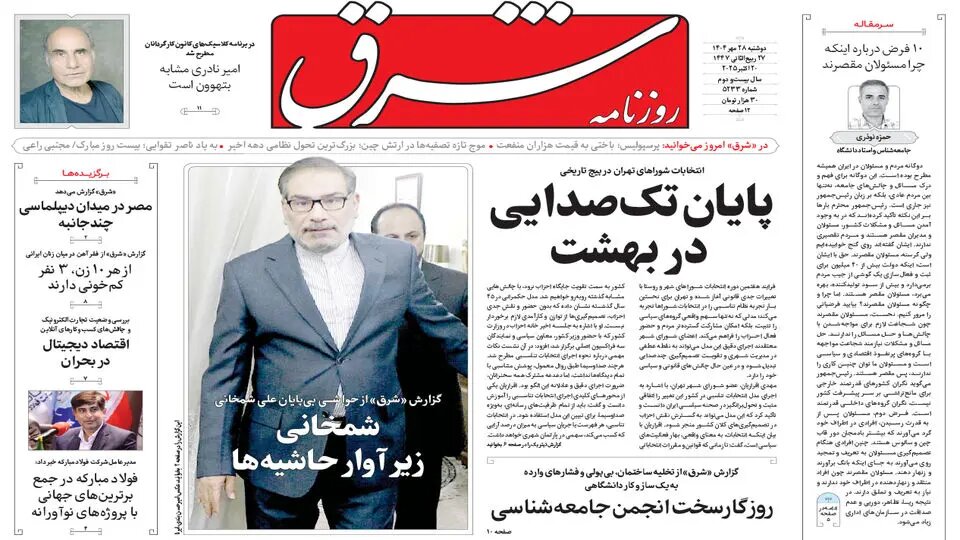Why is a US return to Bagram worrisome for Iran?

TEHRAN - In an analysis, Shargh examined President Donald Trump’s decision to regain control of Bagram Air Base in Afghanistan after the U.S. exit from Afghanistan in August 2021.
The paper said: From Tehran’s perspective, these moves signal the potential opening of a new strategic front on Iran’s eastern border. For decades, Iran has concentrated its military and security resources along the Middle Eastern region, stretching from the Persian Gulf and Iraq to its confrontation with Israel. The redeployment of American forces to Bagram could significantly alter the security dynamics in eastern Iran, compelling Tehran to reassess its defense strategy and reallocate military assets. This shift would require Iran to divert attention from its western and southern fronts toward the east, potentially weakening its deterrence posture against both Israel and the United States over time. Importantly, this is not merely a tactical military maneuver; it represents a symbolic reentry of the United States into a region it was previously thought to have exited. If implemented, the move would pose not only a direct security challenge to Iran but also serve as a broader strategic warning.
Khorasan: New opportunities for Iran
Khorasan, in a note, explored the end of the expiration of United Nations Security Council Resolution 2231 that endorsed the JCPOA. It said: The end of this resolution is more than a legal turning point, and it marks the beginning of a new phase in Iran’s foreign policy. With fewer restrictions, Iran can now engage more freely with Eastern partners in areas such as international trade, dual-use technologies, defense collaboration, and the exchange of technical expertise. In this context, trilateral cooperation between Iran, Russia, and China—particularly in energy, transportation, and peaceful nuclear development—could serve as a plan for broader engagement within BRICS and the Shanghai Cooperation Organization. Moreover, the restoration of Iran’s legal standing as a nation with peaceful nuclear capabilities opens new ways for scientific and industrial partnerships with independent countries. This moment entails active diplomacy and importance of shaping global narratives. The conclusion of Resolution 2231 is not the end of a constraint; it is the start of a new chapter in Iran’s proactive role within a multipolar world.
Ettelaat: Lessons for post-JCPOA era
In a recent article, Ettelaat reflected on the end of the JCPOA after a decade, arguing that the agreement ultimately was a lesson rather than a benefit for Iran. While the JCPOA was intended to lift sanctions and normalize Iran’s nuclear case, the Western parties demonstrated from the outset a pattern of non-compliance, revealing that their true objectives lay elsewhere. According to the article, the most significant result from the JCPOA is the unreliability of Western powers. The agreement underscored that those sanctions remain a persistent tool in the hands of Iran’s enemies, and they have no intention of ignoring them. Pursuing such a path, the article contends, is both illogical and futile. Negotiation has always been part of Iran’s diplomatic policy. However, it emphasizes the importance of understanding the purpose and expectations behind engaging in dialogue. The alignment and objectives of Iran’s enemies have become increasingly transparent, with their intentions now openly declared. In this context, the article calls for national unity and cohesion, urging political factions to coordinate in the face of external pressures. It also highlights the need for intelligent global engagement. Any action that undermines these imperatives, the article warns, effectively helps the enemy and harms Iran’s own interests.
Arman-e-Melli: Solidarity is a strategic asset
In a commentary piece, Arman-e-Melli analyzed Iran’s evolving strategy in response to the snapback mechanism and the support voiced by China and Russia in declaring it illegitimate. The article argues that Iran now intends to scale back its cooperation with the International Atomic Energy Agency (IAEA), distancing itself from the framework established under the JCPOA. This shift is aimed at helping Iran recover from the psychological impact of Western actions, particularly those of Europe and the United States. If Iran can demonstrate resilience and maintain its stance, it may compel Washington to reconsider its pressure tactics and return to the negotiating table. If Iran successfully absorbs the initial shock of renewed sanctions, it will be able to sustain its current course and prove that coercive diplomacy will not force it into negotiations. The experience of widespread public solidarity during the June 12-day war has increased awareness of American overreach and strengthened domestic support for resistance. This alignment between public sentiment and government policy, Arman-e-Melli concludes, represents a significant achievement which must be recognized and preserved as Iran navigates the challenges ahead.
Leave a Comment